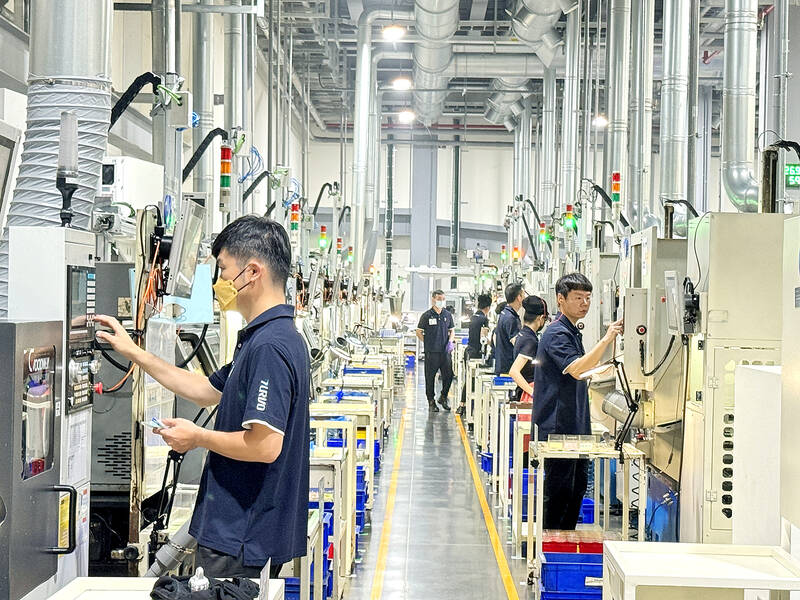The manufacturing industry’s business climate monitor stayed “green” in August, suggesting steady growth, as local tech firms benefited from inventory demand ahead of new product launches by global technology brands, the Taiwan Institute of Economic Research (TIER, 台灣經濟研究院) said yesterday.
It is the fifth straight “green” signal, even though manufacturers overseas remained weighed by a slowdown, the Taipei-based think tank said.
The composite index compiled by the TIER increased 0.29 points from the previous month to 14.1, as the readings on demand and selling prices weakened, but the scores on the operating environment, inputs and production costs climbed modestly, it said.

Photo: Amy Yang, Taipei Times
The mixed results came as local electronics suppliers gained business traction ahead of the releases of a new iPhone series and Apple watches last month, it said.
Taiwanese firms are responsible for making the new iPhones’ camera lenses, chips and other components, the TIER said, adding that the advent of the Christmas season also ramps up business for electronics used in notebook computers, e-readers and peripheral gadgets.
The institute’s data showed the input score added 0.8 points, and both the operating environment and production costs inched up 0.13 points, while demand and selling price lost 0.13 points and 0.65 points respectively.
Business sentiment fell in the first half of August due to concerns about a potential hard landing in the US economy, but the unease subdued after the US job market proved resilient, a relief for tech exporters, the institute said.
By sector, the business monitor flashed the second boom signal for local manufacturers of electronic components, as evidenced by record-high export orders and outbound shipments, as well as strong industrial production, the TIER said.
The recovery extended to other sectors, although in an uneven manner.
Machinery equipment makers reported a business uptick, thanks to demand from semiconductor firms, but base metal suppliers struggled with listless demand and price competition from abroad, it said.
Domestic makers of textile products came out of the woods on the back of the high sales season and the local currency’s depreciation, reversing a hit linked to China’s termination of favorable trade terms, the institute said.
Food and beverage suppliers received seasonal support over the summer vacation and Ghost Month, which fell mostly in August this year, it said.
Ghost Month is believed to be the main reason for a 17 percent decline in new vehicle sales, it added.
However, local makers of auto parts emerged from a business retreat, helped by restocking demand from automakers in the North America market, the institute said.

With this year’s Semicon Taiwan trade show set to kick off on Wednesday, market attention has turned to the mass production of advanced packaging technologies and capacity expansion in Taiwan and the US. With traditional scaling reaching physical limits, heterogeneous integration and packaging technologies have emerged as key solutions. Surging demand for artificial intelligence (AI), high-performance computing (HPC) and high-bandwidth memory (HBM) chips has put technologies such as chip-on-wafer-on-substrate (CoWoS), integrated fan-out (InFO), system on integrated chips (SoIC), 3D IC and fan-out panel-level packaging (FOPLP) at the center of semiconductor innovation, making them a major focus at this year’s trade show, according

SEMICONDUCTOR SERVICES: A company executive said that Taiwanese firms must think about how to participate in global supply chains and lift their competitiveness Taiwan Semiconductor Manufacturing Co (TSMC, 台積電) yesterday said it expects to launch its first multifunctional service center in Pingtung County in the middle of 2027, in a bid to foster a resilient high-tech facility construction ecosystem. TSMC broached the idea of creating a center two or three years ago when it started building new manufacturing capacity in the US and Japan, the company said. The center, dubbed an “ecosystem park,” would assist local manufacturing facility construction partners to upgrade their capabilities and secure more deals from other global chipmakers such as Intel Corp, Micron Technology Inc and Infineon Technologies AG, TSMC said. It

DEBUT: The trade show is to feature 17 national pavilions, a new high for the event, including from Canada, Costa Rica, Lithuania, Sweden and Vietnam for the first time The Semicon Taiwan trade show, which opens on Wednesday, is expected to see a new high in the number of exhibitors and visitors from around the world, said its organizer, SEMI, which has described the annual event as the “Olympics of the semiconductor industry.” SEMI, which represents companies in the electronics manufacturing and design supply chain, and touts the annual exhibition as the most influential semiconductor trade show in the world, said more than 1,200 enterprises from 56 countries are to showcase their innovations across more than 4,100 booths, and that the event could attract 100,000 visitors. This year’s event features 17

EXPORT GROWTH: The AI boom has shortened chip cycles to just one year, putting pressure on chipmakers to accelerate development and expand packaging capacity Developing a localized supply chain for advanced packaging equipment is critical for keeping pace with customers’ increasingly shrinking time-to-market cycles for new artificial intelligence (AI) chips, Taiwan Semiconductor Manufacturing Co (TSMC, 台積電) said yesterday. Spurred on by the AI revolution, customers are accelerating product upgrades to nearly every year, compared with the two to three-year development cadence in the past, TSMC vice president of advanced packaging technology and service Jun He (何軍) said at a 3D IC Global Summit organized by SEMI in Taipei. These shortened cycles put heavy pressure on chipmakers, as the entire process — from chip design to mass